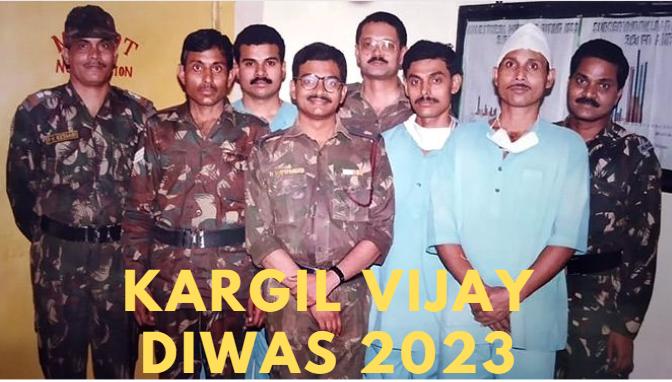Kargil Diwas stands as an important reminder of the valour and sacrifice displayed by the brave soldiers who fought in the Kargil War. As we pay tribute to these heroes, it is essential to reflect on the tremendous physical and mental challenges they endured on the battlefield. Amidst the treacherous terrains and hostile conditions, these warriors not only exhibited unmatched courage but also confronted numerous medical adversities.
1. Physical Health Challenges during the Kargil War
The Kargil War fought at high altitudes in the rugged terrains of the Himalayas, posed severe physical challenges to the soldiers. The extreme cold, limited oxygen levels, and rugged landscapes took a toll on their bodies. Soldiers faced the risk of frostbite, hypothermia, and altitude sickness, also known as Acute Mountain Sickness (AMS). These conditions could be life-threatening and require immediate medical attention.
The war zone was fraught with enemy fire, leading to gunshot wounds and shrapnel injuries. The lack of timely medical facilities and evacuation options often aggravated the severity of these injuries. Medical personnel had to overcome immense logistical challenges to reach the wounded soldiers and provide them with critical care.
2. Mental Health Impact on Soldiers
Beyond the physical adversities, soldiers also confronted profound mental challenges during the Kargil conflict. The constant exposure to violence, loss of comrades, and the uncertainty of each day on the battlefield took a toll on their psychological well-being. Many soldiers developed Post-Traumatic Stress Disorder (PTSD), anxiety, depression, and other mental health issues as a result of their wartime experiences.
Unfortunately, the stigma associated with mental health within the military community often discouraged soldiers from seeking help. This further compounded the emotional burden they carried, affecting their overall quality of life even after returning from the war.
3. Medical Care and Rehabilitation for Veterans
Recognizing the sacrifices of these heroes, the government and medical institutions took steps to address the unique healthcare needs of wounded soldiers and veterans. Specialized military hospitals and rehabilitation centres were set up to provide immediate medical care and long-term support.
Medical advancements played a vital role in improving treatment outcomes. Innovations in trauma care, prosthetics, and rehabilitation techniques helped soldiers recover and reintegrate into civilian life. The dedication of medical professionals, including doctors, nurses, and support staff, played a crucial role in the healing process of these brave souls.
4. The Role of Medical Professionals in Supporting Veterans
Medical professionals have played an instrumental role in supporting the well-being of soldiers beyond their active service. They continue to make significant contributions in providing medical care, addressing mental health concerns, and conducting research to improve the overall health outcomes of veterans.
It is imperative to recognize the importance of specialized training for medical personnel to cater to the unique challenges faced by military personnel. Moreover, fostering a supportive and compassionate environment that encourages soldiers to seek help for mental health issues is of utmost significance.
Kargil Diwas serves as a poignant reminder that our duty to these courageous soldiers does not end with the war. It extends into their post-service lives, as we continue to uphold their honour by championing their well-being and welfare. Only then can we wholeheartedly honour these heroes and express our deepest gratitude for their selfless service to the nation.
http://www.21stcenturyhospitalgownplus.com/
http://www.elite-factory-15.fr/
http://www.gba-amateurboxen.de/
http://www.kita-strausberg.de/
http://sonispicehelensburgh.co.uk/
http://curryzonecardonald.co.uk/
http://cinnamon-edinburgh.co.uk/
http://www.bombaydelipaisley.com/
http://pizzanightclydebank.co.uk/
http://www.pizzanightclydebank.com/
http://gyros2goclydebank.co.uk/
http://grillicious-glasgow.co.uk/
http://www.abdulstakeaway.com/
http://www.freddiesfoodclub.com/
http://cinnamonportobello.co.uk/
http://www.romafishnchips.com/
http://bombaydelipaisley.co.uk/
http://yaraloungerestaurant.co.uk/
http://tasteofchinacoatbridge.co.uk/
http://www.memoriesofindiagorebridge.com/
http://memoriesofindiaeh23.co.uk/
http://freddiesknightswood.co.uk/
http://gyros2gohardgate.co.uk/
http://www.strausseeschwimmen.de/
http://www.janstanislawwojciechowski.pl/
http://london-takeaways.co.uk/
http://shahimanziledinburgh.co.uk/
http://freddiesfoodclub.co.uk/
http://www.spicestakeaway.com/
http://www.mexita-paisley.com/
http://pandahouseglasgow.co.uk/
http://www.zum-alten-steuerhaus.de/
http://www.oberstufenzentrum-mol.org/
http://www.morsteins-neuenhagen.de/
http://www.maerkische-jugendweihe.de/
http://www.planungsbuero-henschel.de/
http://www.hertzelektronik.de/
http://www.militaergefaengnisschwedt.de/
http://www.fahrrad-naumann.de/
http://www.hondamoto-villemomble.com/
http://www.hondamoto-royan.com/
http://www.hondamoto-ajaccio.com/
http://www.download-skycs.com/
http://www.sisakoskameleon.hu/
http://www.hondamoto-montauban.com/
http://www.hondamoto-chalonsursaone.com/
http://www.hondamoto-champignysurmarne.com/
http://www.hondamoto-asnieres.com/
http://www.pasquier-motos.com/
http://www.evacollegeofayurved.com/
http://www.compro-oro-italia.it/
http://www.hondamoto-saintmaximin.com/
http://www.hoangminhceramics.com/
http://www.pasiekaambrozja.pl/
http://www.xn--b1alildct.xn--p1ai/
http://www.ferreteriaflorencia.com/
http://www.thevichotelkisumu.com/
http://www.nexuscollection.com/
http://www.moitruongminhhuy.com/
http://www.ozkayalarpaslanmaz.com/
http://www.munkagepmonitor.hu/
http://www.my247webhosting.com/
http://www.thesmokingribs.com/
http://www.healthlabgrosseto.it/
http://www.ochranakaroserie.cz/
http://www.phukiendonginox.com/
http://www.meijersautomotive.nl/
http://www.kartaestudentit.al/
http://www.podlahyjihlavsko.cz/
http://www.hillhouseequestrian.com/
http://www.gradskapivnicacitadela.com/
http://www.capella-amadeus.de/
http://www.landfleischerei-auris.de/
http://www.faistesvacances.be/
http://www.autoservice-doernbrack.de/
http://www.tabakhaus-durek.de/
http://www.oldtimer-strausberg.de/
http://www.imexsocarauctions.com/
http://www.kaslikworkshop.com/
http://www.firefightercpr.com/
http://www.visuallearningsys.com/
http://www.hanksautowreckers.com/
http://www.impresospichardo.com/
http://www.philiphydraulics.net/
http://www.internationaldentalimplantassociation.com/
http://www.indywoodtalenthunt.com/
http://www.badicecreamgame.com/
http://www.riad-amarrakech.com/
http://www.centrodeformacioncanario.com/
http://www.socialdefender.com/
http://www.pepiniere-paravegetal.com/
http://www.reparertelephonearles.fr/
http://www.namsontrongdoi.com/
http://www.devipujakjivansathiseva.in/
http://www.laymissionhelpers.org/
http://www.vangiaphatdeco.com/
http://www.isscoachinglucknow.in/
http://www.hieuchuandoluong.com/
http://www.aurorabienesraices.com/
http://www.indianmoversassociation.com/
http://www.oztopraklarotomotiv.com/
http://moitruongnamnhat.com.vn/
http://www.dienmayvinhthuan.vn/
http://www.divadelkoproskoly.cz/
http://www.xn--12cfje1df4hdl7f1bf2evg9e.com/
http://www.westernirontrailers.com/
http://www.jazzaufildeloise.fr/
http://www.signcraft-drone.com/
http://www.realtyhighvision.com/
http://www.thermexscandinavia.nl/
http://imobiliariafelipe.com.br/
http://www.salon-lindenoase.de/
http://www.jezirka-zahrada.cz/
http://www.singhanialogistics.in/
http://www.der-pixelmischer.de/
http://www.hegermuehlen-grundschule.de/
http://www.radiologie-strausberg.de/
http://www.foto-studio-matte.de/
http://www.tables-multiplication.com/
http://www.rusztowania-belchatow.pl/
http://www.fishingandhuntingheaven.com/
http://www.orologiegioiellilameridiana.it/
http://www.rotarybresciaest.org/
http://www.jacarandaspain.com/
http://www.javieririberri.com/
http://www.huebelschraenzer.ch/
http://www.illinoiscreditunionjobs.com/
http://www.iznikdenizorganizasyon.com/
http://www.leasebackconcierge.com/
http://www.eoisantacoloma.org/
http://skullbasesurgery.co.uk/
http://www.immobilienplattensee.com/
http://www.germandailynews.com/
http://www.gptdcinternational.com/
http://www.forklifttrainingedmonton.com/
http://www.kashiwanakayama-cl.com/
http://www.thehousemediagroup.com/
http://www.pensiimaramures.ro/
http://www.michaelakokesova.cz/
http://www.viswabrahmanaeducationaltrust.com/
http://krone-aluminium.com.pl/
http://www.broadwaylumber.com/
http://www.ambulancesoccasions.com/
http://www.continuumintegrated.com/
http://www.joilifemarketing.com/
http://www.rotaseydisehir.com/

 On Kargil Diwas, as we bow our heads in reverence to the heroes who fought in the Kargil War, we must remember the medical challenges they endured while defending the nation. Their unwavering spirit and resilience in the face of physical and mental hardships serve as an inspiration to us all.
On Kargil Diwas, as we bow our heads in reverence to the heroes who fought in the Kargil War, we must remember the medical challenges they endured while defending the nation. Their unwavering spirit and resilience in the face of physical and mental hardships serve as an inspiration to us all.









.jpeg)

.jpeg)
.jpeg)
.jpeg)

.jpeg)
.jpeg)
.jpeg)
_(1).jpeg)

_(1)_(1)_(1).jpeg)
.jpeg)
.jpeg)
.jpeg)






